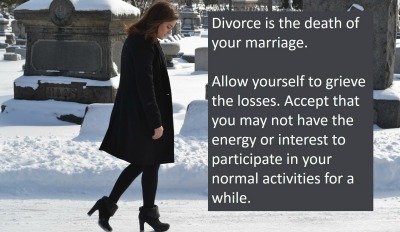Posts by Dr. Karen Finn
What Is Healthy Co-Parenting?
Here are 12 of the most important characteristics of healthy co-parenting.
Parenting children is challenging. Co-parenting after divorce can be especially challenging…and anything but healthy.
So what is healthy co-parenting? And how can two people who couldn’t get along well enough to stay married be expected to co-parent like adults?
The norm for child custody used to be that one parent was the custodial guardian and the other parent had limited visitation. This might be every other weekend with extra time during vacations from school, or a similar but limited arrangement.
Today, however, it is common for parents to share custody of the children after divorce. The giant dry-erase board in the kitchen will be filled in according to “Mom’s week,” “Dad’s week” and a slew of co-mingling events defined by the kids’ active lives.
Co-parenting is greatly influenced by the reciprocal interactions of each parent. In other words, if you as the parents are inconsistent and ununified in your parenting, your children will be the ones to suffer.
When it comes to communication, if you don’t know or practice what is healthy, co-parenting will be unnecessarily difficult for everyone involved. It is a commitment that requires empathy, patience, honesty and open communication.
More than anything else, healthy co-parenting is focused on the kids. If you can keep that in mind as you read on — and as you consider your own circumstances — the prospects of continuing to have your ex in your life won’t seem so daunting.
What is healthy co-parenting? Let’s look at the prominent characteristics and practices of those doing it successfully:
- Clear boundaries.
You understand what you have control over and what you don’t. No matter how right you may think you are about something, the only person you can control is yourself, and the only thing you can control is the example you set.
- Co-parenting is an open-dialogue between both parents.
You may really hate the idea of having to talk to your ex. But remember, your involvement is now limited to the kids and their well-being.If you aren’t ready to talk face-to-face or on the phone, utilize the countless other means of communication — email, text, voicemail, websites for sharing schedules. What is important is that you communicate openly and consistently…and with integrity.
- Consistency with rules in both households.
This can be a tough one when you are trying to create new rules for your life without the limitations of your spouse’s opinions. Children, however, need routine and structure in order to feel a sense of security and predictability. The unified front that is essential in an intact family is just as essential in a divided family — in some ways more so.This means no effort to be the “fun” or “cool” parent at the other’s expense; no trying to be your child’s friend by allowing him or her to put fun before responsibility; no making up a separate set of rules for your time with your kids.
- A pre-determined, predictable schedule to reinforce for the children that they can depend on their parents and make plans in their lives.
- Willingness to be flexible.
This is only possible if respect for the agreed-to plan is the rule and requests for flexibility are openly communicated in a timely manner.
- No disrespectful talk about your ex in front of or from your children.Agree to positive talk in the household. You may still wonder how you ever married your ex, but you must remember that your precious children are 50% “each of you.” Talking badly about the other parent is damaging to your kids, and ultimately to your relationship with them.You can always find something positive about the other parent to vocalize with your children — something that reinforces for them that they have inherited wonderful qualities from both their parents.
- Amicable interactions at school and extra-curricular events.
Focusing on your kids is what is healthy. Co-parenting is about showing up for them, not for your own ego or needs. Children should never have to fear how their parents are going to behave if they are in the same room together.
- Talk about schedule/plan changes with ex before with kids.
This is about adults taking care of the adult stuff and sparing the kids chaos and worry. Again, unified front.
- Frequent updating.Communicate directly with your ex about changes in your life. Never communicate with your ex through your kids. Doing so creates feelings of helplessness and fear in them and can put you at risk of information being miscommunicated.If you are dating someone seriously or have a new job or medical condition, you need to communicate directly with your children’s other parent. Your kids are not messengers.
- Recognition of both parents as significant influences in their children’s lives.
You can’t possibly be all things to your children, and just because you are divorced doesn’t mean you should. Children need to experience both parents and to feel safe and supported as they process the influences from both relationships.
- Basic agreement on the most important things.
Whether or not you and your ex have a written parental plan, you should agree on fundamentals like healthcare, education, discipline and spiritual upbringing. Imagine the inherent confusion for a child who has to do homework in one home but not the other.
- Kids believe their parents get along pretty well.Think about how emotionally liberating it is for a child not to have to worry about his or her parents fighting! Even more liberating is knowing that he or she will never be used as a pawn or messenger between parents because they are acting like mature adults.Even if you and your ex have no intention of laughing over dinner and cocktails together, the consistency of respectful, cordial interaction will be grounding to your children’s security.
By now the question “What is healthy co-parenting?” should have a clear starting point for your own understanding and planning. Healthy co-parenting is about the kids. It’s not about the grievances and dissatisfactions that led to your divorce. It’s about the highest good of the greatest thing that came out of your marriage:
YOUR KIDS.
I’m Dr. Karen Finn, a divorce and life coach. I help people navigate co-parenting with their ex. You can join my newsletter list for free weekly advice. If you’re interested in taking the first step toward working with me, you can schedule an introductory private coaching session.
Looking for more information about dealing with parenting after divorce? You’ll find what you’re looking for in Coparenting.
If You’re Wondering, “Can I Survive Infidelity?” Here’s Your Answer
Surviving infidelity requires that you make it though the emotional pain and rebuild trust.
The dagger of infidelity cuts deeply and scars in layers. It shreds your trust, hopes and dreams. It changes everything.
“Can I survive infidelity?” you may ask. If you are on the receiving end of your partner’s unfaithfulness, you probably feel as if you have been dealt a death blow. In one careless moment he or she has wiped out your marriage and ruined your life…forever.
If you are the unfaithful partner, you may be feeling an equal gravity, but for different reasons. “Can I survive infidelity?” may be a question more akin to “What have I done? And how do I get back what may be lost forever?”
Infidelity, without question, comes with heavy consequences. It can hit your life with the unexpected force of a tornado, and render equally disastrous effects.
A tornado doesn’t survey its target area before wiping it out. It doesn’t seek out victims based on income, home size or marital bliss. And, while infidelity certainly isn’t a random act of nature, it is equally non-partisan in its demographics.
Think infidelity is limited to unhappy marriages? Convinced you can see it coming for some and assume safety from it for others? You may be surprised to know that, while some marriages may be primed for cheating, infidelity happens even in the best of marriages. And it happens for many reasons, not the least of which are opportunity and context.
Feeling gut-punched by an unexpected devastation can literally take your breath away. And because breathing is essential to life, it is natural to wonder, “Can I survive infidelity?” as you struggle for every breath.
The question isn’t so much about physical survival as it is about emotional survival.
Cheating can ravage both partners with feelings for which they are unprepared. Anger, rage, hurt, disappointment, fear, guilt, shame, embarrassment, jealousy, mistrust, denial, blame — they can come in by the busload and set up camp in your life. And yes, as with any form of stress, they can lead to physical effects, as well.
While your first reaction may be “we’re over,” it is not a given that your relationship has to die. “Can I survive infidelity?” isn’t a solicitation for a prognosis, it’s a reflection that beckons a choice.
There are certainly relationships that need to end. Abusive environments and serial cheating are both examples of circumstances that are beyond the scope of this discussion.
First and foremost — impossible as it may seem in the early stages of learning about an infidelity — do not make any major decisions about the relationship while it is in crisis mode. Reason cannot function while stewing in a cauldron of rage and pain.
No matter what the final decision is going to be, you will need all your wits about you. And, in fairness to both of you and to any children you may have, you will need to reach a phase where you can communicate clearly.
It is natural to be obsessed with the details of the affair in the beginning. But if your marriage — and your emotional survival — stands a chance, you will both have to commit to an insightful exploration of your relationship.
People cheat for many reasons. Good people cheat on good marriages, and for reasons they may not even understand. Some have fallen out of love and have lost their sense of deep connection to their partners. Some may use cheating as a justification to end the relationship.
More often than not, cheating is a catalyst for conversation. A person who has been attempting to communicate something difficult and feels unheard or disregarded may turn elsewhere for validation. And the rest becomes a painful history.
The need to be heard and the ability to truly listen are so vital to intimacy and relational success that ignoring their importance can be the seed of a relationship’s downfall.
Repairing and healing your marriage after infidelity requires a full commitment from both partners. It starts with a choice to save, restore and revitalize what has been damaged, but which doesn’t have to be lost.
Just as with communities that rebuild from the rubble left after a natural disaster, saving a marriage damaged by infidelity is a choice to see what is both salvageable and worth saving.
Repairing your marriage requires tremendous patience, as well as ongoing discussions of ways to remedy the marriage. While you are both working on a common goal, your roles may seem to be polar opposites. The roles you will need to do away with, however, are those of victim and villain. The road will be bumpy, so expect the awkwardness and discomfort as you rebuild.
If you are the partner who strayed, you will have to be a safe place for your partner to voice her/his anger and hurt. It will not be enough to simply apologize for “all the hurt” and expect that to be enough.
You will need to apologize daily, then weekly, then monthly. You will need to listen with a courageous heart, knowing that you may rarely like what you hear. You will also have to be humble and transparent in an effort to regain trust by earning it.
It won’t be comfortable handing over your passwords and text messages to your offended spouse. You may feel punished and belittled for having to account for every little move. But hold onto the the idea that you are re-earning the trust of a beloved whose trust you have shattered. And keep in mind that your partner will be spending her/his days wondering, “Do I have reason not to trust my spouse today?”
“Can I survive infidelity?” The answer is an unequivocal, hard-earned “yes.” If you realize that you have something worth saving, and both of you are willing to do the work, you can get through this. You can even come through with a stronger marriage than you had before.
Three steps will be essential to the process:
- Rebuilding trust. This requires the expression of true remorse on one side and forgiveness on the other.
- Building honesty and transparency into the relationship and committing to talk about all the difficult stuff.
- Patience.
With the help of a professional who specializes in infidelity issues, you can get through this. One partner will have to provide a safe place for the broken-hearted spouse to land. And the other will have to give the unfaithful partner a chance.
I’m Dr. Karen Finn, a divorce and life coach. I help people make it through their divorce journey and create a happy post-divorce life. You can join my newsletter list for free weekly advice. If you’re interested in taking the first step toward working with me, you can schedule an introductory private coaching session.
Looking for more information about the repercussions of cheating? You’ll find what you’re looking for in Surviving Infidelity.
How To Get Over An Unwanted Divorce
Nine realistic and practical tips to help you with your journey of healing from an unwanted divorce.
There is a saying in psychology that “All relationships end. Someone either leaves or dies.”
If you are wondering how to get over an unwanted divorce, this may be small, if any, consolation. Especially if you have been deeply invested in the relationship, it may actually sound dismissive.
In a general comparative sense, divorce is similar to death. Both are final losses, whether of people, dreams or both.
If you have been left holding the grenade of an unwanted divorce, you probably have some “yeah, but’s” to add to that argument.
“Yeah, but death doesn’t mean you still have to see the other person.”
“Yeah, but death isn’t done ‘to’ you.”
“Yeah, but death doesn’t leave you feeling unlovable.”
Being left to figure out how to get over an unwanted divorce can also leave you feeling shamed, isolated and rejected. Your emotions will run the gamut of anger, guilt and a willingness to do anything to save your marriage.
What you may not expect is the difference in the empathy and support received in the case of death versus an unwanted divorce.
While you feel the same degree of pain in both losses, your support system can be divided, even somewhat judgmental, when it comes to divorce.
Knowing how to get over an unwanted divorce starts with accepting that the marriage really is ending. Even though it is only natural to feel shell-shocked and to react out of anger or desperation when you learn your spouse wants a divorce.
Crazy as it sounds, you may want nothing to do with him/her again, while prostrating yourself before her/him in a plea to work things out. Heck, you may actually think that death would have been the better option.
The end of your marriage may not be your choice; but how you navigate out of it unequivocally is. So buckle up. Expect some turbulence…and set your sights on a new destination.
Tips on how to get over an unwanted divorce:
- Expect to grieve.The nature of the loss doesn’t matter. It’s a loss. Your dreams with this person have been yanked out of your heart forever, and the sting is real.Allow yourself to process through the five stages of grief (denial, anger, bargaining, depression, acceptance), but give yourself a time limit. Pretending to be “over it” too soon will only suck you into stuffing your feelings and repeating old scripts. Putting no limits on your grief will keep you stuck in self-pity and isolation.
- Do not expect time to heal all wounds.
While it is imperative to embrace the grieving process, expecting to come out the other side with an “all’s forgotten” new take on life is unrealistic.Yes, time does extend the grace of healing for many wounds. But some are always going to be there.
The gift of time is to diminish their sting so that you can shift your perspective on the pain. One day you will appreciate it as an opportunity to learn and grow.
- Love thyself.
Focus on self-love. Of all the expert advice you will receive, none will be as important as this.So let me say it again: Love thyself. Remember that you are worthy of love.
Your self-esteem has taken a beating, and you may feel deeply scarred as unworthy and unlovable. But your life going forward has to reflect that you can find true happiness without relying on someone else. You do not need to be “completed” by another person. - Remember who you were before your marriage.
It is easy and natural for spouses to surrender much of their individuality to the joint identity of the marriage. Go back and contemplate who you were before you did that.What did you dream of doing for yourself? For the world? This is a ripe time to foster those interests in an assertive, enthusiastic way. Take classes. Travel. Redecorate. Make bold plans. Honor your individuality.
- Get reacquainted with yourself.
In addition to remembering who you were prior to your marriage, nurture your intimacy with who you are today. What makes you happy?Perhaps your marriage helped you to discover new sources of joy. It is a wonderful element of healing to be able to identify those things and bless them as you bravely explore your new life.
Not everything has to be thrown out just because it grew out of a marriage that is now over. The important thing here is to respond affirmatively to the calling of your own spirit.
- Build a support system.
Surround yourself with dependable, compassionate, non-judgmental people to help you through this time. Turn to people (family, friends, a therapist, a divorce coach) who will motivate you to work on yourself, and stand by you as you do. - Take care of yourself.
The magic of this otherwise painful journey is that you now have the fresh opportunity to become your best self. Experiment. Play. Pamper. Be kind to yourself. And remind yourself what it feels like to be loved and cared for…by the person who does that better than anyone…you. - Focus on important life goals.
When you are navigating how to get over an unwanted divorce, it is natural to get stuck in the belief that there is no long-term future for you.Instead, make the conscious commitment to goals that will benefit you in the long term and not simply provide temporary relief. Consider taking classes, working toward professional advancement, and/or taking up a new exercise program.
- Take your time with new relationships.The more you feel the craving to be connected again, the more you most likely need to focus on yourself. Rebound relationships serve no one, and can just confuse you and set you back. (Although transitional relationships where both parties know that’s what the relationship is can be extremely helpful.)Give yourself the time to “come into your own” again. Become your best self so that you have something to offer the next person and clarity when seeking someone new.
Divorce is a gut-wrenching time no matter what leads to it. But when your spouse initiates it, to your surprise and/or disappointment, it sweeps another set of painful emotions into the mix.
If you are experiencing this one-sided decision and don’t know how to get over an unwanted divorce, start with the tips above. You will notice that they all have a singular focus: you. And at a time when you can feel incredibly abandoned and rejected, you can experience the cumulative effect of love-in-action by being your own best companion.
I’m Dr. Karen Finn, a divorce and life coach. If you would like additional help in getting over an unwanted divorce, I can help. You can join my newsletter list for free weekly advice. And, if you’re ready, you can take the first step toward working with me as your personal coach by scheduling a private consultation.
Looking for more information about getting over your divorce? You’ll find what you’re looking for in Healing After Divorce.
Co-Parenting: What Not To Do
Knowing these co-parenting what-not-to-do’s will help you be a better parent post-divorce.
Co-parenting after divorce is tough. But did you know you can make it even harder for yourself, your ex and your kids?
That’s why when it comes to co-parenting, knowing what not to do is just as important as knowing what to do. There is plenty of online advice for what you should do when co-parenting, but it rarely goes into detail about what not to do.
And this lack of clarity about the co-parenting what-not-to-do’s is often confusing for those parents who are trying their best to co-parent yet somehow, they just can’t seem to make it work as well as they’d like.
The lack of clarity can cause parents to believe that their behavior is appropriate when in reality it isn’t.
Regardless of where you fall, knowing what not to do when it comes to co-parenting (and then not doing it) will make you a better parent.
The co-parenting what-not-to-do’s fall into 8 different categories:
- Communication And Collaboration
You probably already know that the foundation for successful co-parenting is communication and collaboration with your children’s other parent. Yet this can be difficult to achieve when your divorce still feels fresh.Here is a list of things that co-parents do that make co-parenting more difficult and even impossible:
Have no plan for communicating with your ex about parenting issues. Parenting issues will arise – guaranteed. So, knowing ahead of time how you will address them will remove the potential for conflict.
Be contentious and accusatory when you have a problem with your ex’s parenting. Ever heard the phrase you’ll catch more flies with honey? Well, the truth is it’s true of communicating and collaborating with your children’s other parent too. If you truly want your ex to change their parenting, then typically your first best option is to speak to them with respect about the matter.
Don’t plan anything with your ex. Coordinating schedules is part and parcel of successful co-parenting. Not doing so is a recipe for disaster.
Make your kids speak to their other parent for you about everything. You can’t expect your children to communicate with your ex for you. That’s unfair and leaves the kids in the middle instead of feeling free to love you both. Besides, there are some conversations that are meant for adults and not children.
Neglect or “forget” to keep your ex up-to-date with any scholastic, medical, psychiatric, extracurricular activities or appointments you make for your children. Regularly doing this is antithetical to co-parenting. Co-parenting is about the kids. It’s not about getting back at your ex or keeping your ex in the dark about what’s going on with the children.Keep your ex in the dark about all changes in your life or circumstances that are challenging or difficult. Successful co-parenting and healing from divorce usually requires boundaries to keep your personal lives separate. However, if what you’re dealing with impacts your children, letting your ex know about your situation is necessary.
Refuse to work with your ex for your children’s participation in extracurricular activities. Remember, co-parenting is about your children and doing what’s best for them. By working together to support your children’s interests you’re helping them – not your ex.
Ignore whatever your ex has to say if it doesn’t align with what you want. Effective communication is about you and your children’s other parent respectfully speaking AND listening to each other – even if you disagree.
Consistently refuse to agree with each other about nearly everything. Co-parenting requires and ability to compromise. If you find that you’re consistently unable to compromise with your ex, you may need outside assistance to resolve the disagreement.
- Behaving As If You’re Your Children’s Only Parent
Co-parenting is about working together and respecting each other as parents. So, unless the courts have determined that your children’s other parent is no longer their legal parent, you aren’t their only parent.Here are some ways that parents will behave as if they’re an only parent:
Ignore the rules and discipline your ex has for your children. Children need as much consistency as possible. Does that mean that everything is the same between your home and your ex’s? No, but it does mean that you’re more consistent that not – for your children’s sake.
Don’t tell your ex if you move or change your phone number. Your children’s other parent needs to be able to reach you and generally know where the children are when they’re with you.
When you travel with your children, don’t tell you ex or provide any means for her/him to contact you or the kids. Again, your children’s other parent needs to be able to reach you and generally know where the children are when they’re with you – even if the travel is due an emergency or happens on the spur of the moment.
Refuse to defer to your ex for child care. Your children love both of you and enjoy spending time with each of you. So, if you need childcare that your ex could easily help with, then it only makes sense to first ask your ex to help out before asking anyone else. And if they say “yes,” your children can enjoy the time with their other parent instead of a babysitter.
Expect your ex to have ZERO influence in your children’s lives. Your ex will have a huge influence in your children’s lives whether you like it or not. Your children love both of you and want to please both of you. Let them know that it’s OK if they do things like their other parent sometimes and like you at other times.
Ignore your ex’s calls and texts. It’s rare that ignoring your ex’s calls and texts is an appropriate action when you’re co-parenting. Doing so regularly is highly disrespectful and will only harm your co-parenting relationship which in turn will harm your children.
Ignore the parenting plan schedules you had to agree to, so you could get divorced. The parenting plan schedules were put in place to help your children and are meant provide you and your ex guidelines for being the best parents you can be. If your schedules need to be adjusted, work together to do so for the benefit of your children.
- Encourage Or Demand That Your Children Break All Ties With Your Ex And His/Her Family
Your children are a wonderful combination of you and their other parent and by extension your families. So, they deserve to spend time with and know the amazing people they’re related to – even if you’ve never liked them or they’ve never liked you.Here is a list of co-parenting what not to do’s when it comes to allowing your children to interact with your ex and her/his family:
Regularly talk poorly about your ex and/or your former in-laws in front of your kids and encourage others to do so too. When your children hear you or anyone else talk poorly about their other parent and their other parent’s family, they are hurt. Your children know that they’re part you and part your ex. And when you say disparaging things about your ex and your former in-laws your children hear you talking disparagingly about them too.
Encourage your kids to talk poorly about their other parent. This is the same as teaching your children to not only disrespect their other parent, but to disrespect themselves.
Do your best to prevent your children from ever interacting your ex’s side of the family. Unless your children are in imminent danger by being around their other parent’s side of the family, you have no business interfering with their relationships. Your children deserve to know the people their related to and who love them.
Make sure your kids love you the most. When you try to coerce your children into loving you the most, you’re undermining a relationship your children need to have fostered. Your children love you and your ex. You’re their parents, so you both have the job of encouraging your children to express and nurture the love they feel for each of you.
Always refer to your ex as your ex in conversations – even with your children. Your children aren’t interested in your marital status – in fact it’s painful for them to be regularly reminded of it. They know you both as their parents and deserve to hear you refer to their other parent as “Mom” or “Dad” or as your children’s “other parent.”
Put your children under pressure to choose between you and their other parent. Asking your children who they’d rather live with and doing what you can to make sure it’s you, regularly telling your children, “I miss you!” when they’re with their other parent and making them feel guilty for any time they don’t spend with you are all ways you’re coercing your children to choose between you and their other parent.
Telling your children your new significant other is their new parent. Your children already have two parents. If you should remarry, your children will have a bonus parent or a stepparent, but no one will ever replace their parents.
When your children tell you things about your ex that upset you, immediately jump to conclusions and condemn your ex in front of your children. If your children do tell you things about your ex that upset you, you need to pause and decide if it’s enough of an issue or concern for you to discuss the matter with your ex or not. If not, don’t react. If it is, don’t react and schedule some time to respectfully discuss the issue with your children’s other parent.
- Neglect Your Parenting Responsibilities
Getting divorced isn’t easy. And self-care is necessary as you make your way through it, but self-care is different from ignoring your parenting responsibilities.You’ll know you’re taking your self-care too far if you find yourself doing any of these things:
Consistently putting your wants and needs above your children’s needs and rights for psychological, spiritual and physical well-being and safety. Despite the difficulties of your divorce, your children still need and deserve to have you care for them as the precious beings they are. Doing so will help them more easily get through the divorce too.
Keep your kids guessing about how you’re going to act today. Another way parents don’t live up to their parenting duties post-divorce is by being unpredictable. Sure, the emotional rollercoaster of divorce is real and you have your feelings to sort out, but children (including yours) thrive on consistency.
Grant your children’s every wish without limit to alleviate your feelings of guilt about the divorce. All parents want their children to be happy. However, all parents also want their children to grow up to be happy adults. And most happy adults understand core values and the need to contribute instead of having their every wish granted. The world just doesn’t work like that.
Punish your ex by allowing your children to shirk responsibility. Part of successful parenting is teaching your children responsibility. It doesn’t matter how much you hate your ex or how much you think they should suffer for what they’ve done, your children must take priority over ideas of vengeance.
Disregard your children’s presence when you argue with your ex. Children suffer greatly when they’re around conflict – especially when that conflict is between their parents the two people they most want to please. Your children will feel responsible for making things better between the two of you which is impossible for them to achieve. And the futility of their efforts will wear away at their sense of safety, capability and even self-esteem.
Regularly break the agreements you make with your children. Your children depend on you. They look forward to spending time with you. They want to trust you. If you’re consistently breaking your word with them (regardless of the reasons for doing so), then you’re undermining the relationship you have with them. And your children will take it personally. They may even start believing that you don’t love them anymore.
- Expect To Control Your Ex
Regardless of what you think of your ex’s parenting abilities or their parenting philosophy, unless your children are in danger you must let go of your desire to micromanage your ex.You may already know that, but you may also be doing things that you don’t realize that are definite co-parenting don’ts. Below are some of the mistakes co-parents make.
Withholding child visitation because you want your ex to stop doing or start doing something. Of course, if your ex is a true threat to your children, you should get the proper authorities involved. But if your children’s other parent isn’t a threat to them, then this is straight up cruelty and viciousness directed at your ex and your kids.
Having unclear boundaries with your ex. The truth is you don’t get to control what happens at your ex’s house or in their life. And they don’t get to control what happens at your house or in your life. Getting clear about what is and isn’t appropriate now that you’re co-parents is critical to becoming great co-parents.
Airing dirty laundry on social media. The people you know on social media don’t need to have unfiltered insight into what’s going on with you or your ex. And using social media to try to shame your ex into behaving differently is shameful on your part.
Jumping to conclusions, overreacting, criticizing, blaming, being accusatory, being rude, being mean and sarcastic, making demands, using profanity, being unreasonable with deadlines, being disrespectful and calling names are all signs you’re attempting to bully your ex. Doing these things is never acceptable behavior. If you find it difficult to prevent yourself from being so disrespectful to your ex, please reach out for help because these behaviors will not only destroy your co-parenting relationship but they cause your children anguish too.
Making a big production out of any event you and your ex attend for your children. Your children want you to be proud of them and they want to be proud of you. If you’re unable to put your feelings for your ex aside when you’re both attending events for your children, then you’re disappointing your children and embarrassing yourself.
Using your children to sway your ex to your way of thinking or doing things. Your children aren’t pawns you can use to manipulate your ex. You need to allow your children to be children and not your minions.
- Expect Your Children To Be Your Friends Or Support System
If you have older children, you may need them to take on more responsibility for helping around the house now that you’re divorced. However, expecting your children to deal with the practical and emotional issues you’re dealing with as a result of your divorce is completely inappropriate.You’ll know you’re falling into the trap of this co-parenting what-not-to-do if:
You complain to your children about the problems you have – especially those you have with your ex. Your divorce and the repercussions of it are yours to come to terms with. Your children aren’t prepared to deal with the adult realities of divorce. They have their own challenges because of the divorce and don’t need to take on you and your burdens too. It’s your job to be there for them, not the other way around.
You have unclear boundaries with your children. Children need well-defined boundaries to understand who’s responsible for what. They also help children to develop respect, self-control, responsibility and know who they are – all keys to being able to successfully navigate the world when they become adults.
You keep your children informed about all the details regarding custody negotiations and court appearances. Coming to an agreement for your divorce is between you, your lawyer, your ex and his/her lawyer. The ironing out of the details are none of your children’s business and bringing them fully into it will only make their lives much more difficult.
You are your children’s friend instead of their parent. Being a parent is much more complicated than being a friend. Being a parent requires that you have boundaries, limits and structure in place. It also requires that your children have time away from you to develop their relationship with their other parent and to start to gain some independence. You’ll be stunting their intellectual and emotional growth if you choose to be their friend first instead of their parent.
- Use Your Children To Keep Tabs On Your Ex
It’s natural to be curious about how your ex’s life is going. You might even feel jealous when s/he is doing well, or happy when s/he isn’t.However, using your children to keep tabs on your ex is a definite no-no when it comes to co-parenting. Instead, you need to talk directly with your ex about any questions you have and be willing to accept it if your ex tells you what you’re asking about is none of your business.
Just to make sure you’re not accidentally using your children to keep tabs on your ex, you’ll want to be aware of these behaviors:
You question your children about everything they do while they’re with your ex. Your children’s time with their other parent is about growing their relationship not for you to learn more about your ex’s life. Unless you have significant reason to believe your children are in some kind of danger with your ex (and you should be getting help from the proper authorities if you do), you need to let your children have their relationship with their other parent.
You ask your children to do specific things while with your ex. You may ask them to look for something or to say something, so they can report their findings back to you. Putting your children in this position isn’t healthy for anyone. Your children will suffer if they do as you ask because they’ll be betraying their other parent. And if they don’t do as you ask, they’ll also suffer because they’ll be betraying their relationship with you. You’ll suffer because you’ll not be communicating with your co-parent in a productive way. And your ex will suffer due to your lack of respect.
- Don’t Heal From Your Divorce
Getting over a divorce is difficult, however, it is possible and necessary if you’re going to be a great parent for your children and move on with your life. By healing from your divorce, you’ll be teaching your children powerful lessons about resilience, forgiveness and dealing with disappointment.You’ll know that you’re not healing from your divorce and undermining your parenting if:
You’re sure you’ll hate your ex for the rest of your life. The longer you hate your ex the longer you’re letting them control you. And you probably don’t want that.
You’re terrified of ever being in another relationship. Just because your marriage didn’t work doesn’t mean that it’s impossible for you to have a good relationship.
You can’t seem to shake the feeling of being a failure. Your relationship failed, and you played a part in things not working out. However, that doesn’t mean that you’re a failure.
You’re unable to forgive yourself. Everyone makes mistakes. You’re no different. However, refusing to let yourself learn from your mistakes and move on with your life is guaranteeing you a lifetime of unhappiness. And that’s probably not something you want to model for your children.
Knowing what not to do will definitely help you be a better co-parent. However, don’t beat yourself up if you discover that you’re doing one or more of the co-parenting what-not-to-do’s listed above. We all have bad days and we all make mistakes. Just course correct as soon as you’re able (and reach out for help if you need it).
If after reading these co-parenting what-not-to-do’s, you’re clear that your children’s other parent is having a difficult time co-parenting, you have a few of options:
- You can discuss the situation with them.
- You can switch from co-parenting to parallel parenting.
- You can take them back to court to change the parenting agreement.
Parenting after divorce is difficult. And by knowing what not to do and then not doing it, you will be making things better for your children, yourself, and your co-parent.
I’m Dr. Karen Finn, a divorce and life coach. I help people navigate co-parenting with their ex. You can join my newsletter list for free weekly advice. If you’re interested in taking the first step toward working with me, you can schedule an introductory private coaching session.
Looking for more information about dealing with parenting after divorce? You’ll find what you’re looking for in Coparenting.
7 Tips For Adjusting To Life After Divorce
Life post-divorce is different from married life. By using these tips, your different can be great.
The dress. The guests. The honeymoon. Newlyweds walk down the aisle planning a life of home and happiness, not adjusting to life after divorce.
But statistics speak to the glaring frequency of divorce:
- 41 percent of first marriages end in divorce.
- 60 percent of second marriages end in divorce.
- 73 percent of third marriages end in divorce.
Every divorce is different, of course — as unique as the individuals going through it. The age at which the two people married; the length of the marriage; the presence or lack of children. Countless factors chime in to make this painful journey as personal as the feelings each person experiences. Adjusting to life after divorce, therefore, is also a personal journey.
There are, however, many tips for helping those on the road to singlehood make that adjustment and come out the other side whole and happy. Let’s look at 7 of the biggies:
- Let yourself mourn.
Divorce is a loss, plain and simple. It really doesn’t matter who initiated the split, or who owns what responsibility for what actions leading to it. It’s a loss — a death of the dreams that beamed in your eyes on your wedding day, and a complete upheaval of all your “married habits.” Expect and allow yourself to feel the emotions of grief. Fully experience its predictable stages as you are adjusting to life after divorce. And don’t be surprised if those feelings jump right into the big hole where something important used to be. - Work through your feelings.
The importance of this really can’t be stressed enough. When something hurts as much as divorce, it is only natural to want to numb the pain. There is no emotional morphine for doing this work. Keep reminding yourself that you don’t want to drag your baggage into your new life. The “new you” doesn’t deserve it. Anyone who may come into your life certainly doesn’t deserve it.And if you are inclined to believe that seeking help from a therapist implies there is something wrong with you, think again. Therapists and coaches are there to help you strategize and process all the ugly, mucky “stuff” that you simply have to get through.
- Dare to be alone.
30 million people live alone. Being one of them doesn’t have to be a lonely experience. Yes, it’s cliché, but if you shift your perception of the word “alone” to “all one,” you will hopefully see both the necessity and opportunity for wholeness within yourself. Just as with processing your feelings, learning to be alone — and to be comfortable that way — is essential.And this is where time is your friend. Rushing into a new relationship is perhaps the biggest mistake people make when going through a break-up, let alone a divorce.
It doesn’t matter how long you have lingered in an unhappy marriage before deciding to divorce. Being unhappy for years doesn’t earn you “movin’-on stripes.” It simply means there is that much more emotional work to process.
It doesn’t matter if you think you were the victim and therefore deserve to move on. (Actually, that one does matter. Unless you have been a victim of abuse, you need to own your own contribution to a relationship that didn’t work. Cliché again, but “there are no victims…only volunteers.”)
It doesn’t matter that you don’t want to be alone forever. Until you are capable of and comfortable being alone, adjusting to life after divorce will be painful. And if you jump too early into a relationship, it will likely end in divorce or at least unhappiness too.
- Learn to like yourself…again.
This is a big motive behind the need for being alone and allowing yourself to process emotionally.It is natural to feel rejection, shame, guilt, fear and a slew of other low-frequency emotions after a break-up. You have a new life to go forth and take by storm, and you are going to need all your confidence for the task.
Adjusting to life after divorce is largely about confidently “coming into your own.” It’s a time of remembering who you were before you married, loving who you are now…and discovering who you want to become.
A coach can provide wonderful support for your journey, especially when you don’t feel there is much to like in yourself.
- Know your purpose.
What matters to you? What do you value? What difference do you want to make in the world? What do you like to do?This is a great time to write. Words on a page can help you process…and discover.
Writing is also a great way to reaffirm that you are important, and you have gifts that matter. By connecting with your deepest yearnings and sense of purpose, you will awaken your drive. And don’t be surprised if you feel a big boost in your confidence and self-esteem too.
- Learn some new skills.
You are now on your own, adjusting to life after divorce, and the workload of life can feel pretty overwhelming. Suddenly you are having to do everything — even things you don’t know how to do.If you are co-parenting, you will still have to assume a lot of responsibilities once delegated to your spouse’s expertise. So, you’ll stumble upon learning some new skills.
However, in addition to the new skills you’ll naturally learn as part of living on your own, you may also want to consider taking a class or brushing up on some skills that will help you further your career…or start a new one. And don’t deny yourself the joy of learning something new simply because it interests you.
- Indulge in some “me” time.
Life after any kind of loss can be draining to the spirit, and a diminished sense of self can lead to lack of self-care.However, simple things like regular exercise, a pedicure, having your hair done, and taking yourself to a new cafe for lunch can be nurturing indulgences.
These little practices will also build your confidence and enjoyment in being alone. “But I’m ALWAYS alone! I’m divorced!” you may be saying. “Me” time is different. It’s a gift of purposeful, uplifting, nurturing time that you give to yourself. Consider it a date with the best person you know: YOU.
The most important thing to remember is that divorce doesn’t define you. What matters is how you navigate the divorce process. Be compassionate toward yourself. And open the door to the help and support of those who love and care about you. A new and hopeful life awaits!
I’m Dr. Karen Finn, a divorce and life coach. I help people with adjusting to life after divorce. You can join my newsletter list for free weekly advice. If you’re interested in taking the first step toward working with me, you can schedule an introductory private coaching session.
Looking for more information about adjusting to life after divorce? You’ll find what you’re looking for in Life After Divorce.
What Does An Unhappy Marriage Look Like?
Does your marriage exhibit one or more of the typical symptoms of an unhappy marriage?
It’s normal to wonder about the viability of your marriage when you’re not as happy as you’d like. And the wondering can be both frightening and confusing. “Are we really that unhappy?” “What does an unhappy marriage look like?” “Is this salvageable?” “Is it me?” “Is it him?” “Is it her?” “Maybe all marriages get to be ho-hum. We can’t expect to be truly happy forever, right?”
It’s not unusual for couples to spend years in an unhappy marriage before it dawns on them to ask, “What does an unhappy marriage look like?”
Yes, there are the obvious betrayals — infidelity, abuse, addiction — but symptomatically even these don’t guarantee divorce. The truth is, there is never just “one” reason, one symptom, that causes a person to choose divorce.
Unhappy marriages grow insidiously from a lack of correction of harmful — even if subtle — behaviors and choices. And happy marriages taken for granted and left undernourished can render their partners asking, “How did we get here?”
The very thing that makes romantic love so exclusive and unique is the same thing that can be its undoing. Intimacy involves vulnerability. And that kind of exposure means that another person has power to both heal…and hurt. That is an awesome gift of trust…and an awesome responsibility.
So what does an unhappy marriage look like? Are there specific qualities that are always present? Every marriage, happy or unhappy, is unique.
But if you’re in an unhappy marriage, you will undoubtedly recognize at least some of the following:
- You’re not having sex anymore, and there is a lack of visible affection. Remember, intimacy, both physical and emotional, is what separates romantic love relationships from all other relationships.
- You have nothing meaningful to say to one another. Your conversations revolve around the pragmatics of running a home, taking care of kids, going to work and paying bills.
- One or both of you are having an emotional affair. Your spouse should be your primary confidante for communication about both happy and difficult matters. If you are reaching out first to a friend — especially of your spouse’s gender — you may be emotionally detaching from your marriage.
- You are playing the blame game. Arguments should be about communication and improvement of the relationship. They should never be about inflicting pain. Use of blaming language — “You always,” “You make me feel,” “It’s your fault,” etc. — inevitably incites counter-blame and hurt feelings.
- You are physically in one another’s presence, but there is no real engagement. You have essentially disconnected and become roommates who simply accept the fact that you live together.
- You distract from your own feelings by focusing on the needs and problems of others. And most commonly the “others” are your children. Yes, your children do deserve to have your attention and love, but not to the exclusion of spending time with your spouse and fixing what’s wrong in your marriage.
- You are delaying or avoiding getting help to fix things in your marriage. You know things aren’t right, but you continue sweeping the problems under the rug and won’t examine your relationship in the context of the question, “What does an unhappy marriage look like?” The result is that you don’t get the timely help you need to turn things around.
- You fantasize about a life without your spouse. Your daydreams of happiness don’t include your spouse. This psychological detachment is a way of convincing yourself you really don’t care so that there is less pain when the final separation happens.
- Your lives have different directions. If you are not communicating, you can’t align your goals. If you aren’t regularly communicating about the things that are most important to each of you, you’ll eventually begin noticing conflicting differences in your perspectives toward life and your goals. Your faith and politics may suddenly be starkly misaligned. Your ideas for the future of your marriage and family may not resemble anything you co-created in the early days of your marriage. And differences like these can be at the root of a miserable marriage.
- You have separate lives. Even couples with children and heavy workloads can create and maintain intimacy with healthy, ongoing communication. If you and your spouse aren’t making the effort, however, to understand each other’s work and interests, the intimacy required for a happy marriage will quickly erode.
- You have needs not satisfied by your partner. These needs could be sexual, emotional, physical, or spiritual. And when they go unmet you look for ways to satisfy them. You could address them all yourself, or you could look to someone else. And if you look to someone else to address your unmet needs, you’re definitely dealing with an unhappy marriage and could even be on the slippery slope toward divorce.
- You or your spouse have unreasonable expectations and/or make unrealistic comparisons. Do either of you have unreasonable expectations that the other simply can’t meet? Do either of you make comparisons to “happy couples” and other marriages in an effort to apply pressure or guilt?
- You have stopped fighting. Obviously, there is a fine line between healthy fighting and fighting all the time. But fights have the potential to lead to greater intimacy if they are processed and repaired with commitment and compassion.If you have stopped fighting, it is often a sign you’ve stopped caring.
- You don’t feel heard, respected or valued. Listening — true listening — is the greatest tool in building intimacy. When couples truly care about one another, it shows in how they communicate, and especially in how they listen. Conversations, even arguments, have little to do with the topics themselves, and everything to do with listening for the underlying emotions and feelings.
- You feel controlled by your spouse or your spouse feels controlled by you. For example, one spouse may impose financial control over the other, limiting that person’s freedom and inclusion in decision-making regarding money.
- Ego and superiority issues that leave one or both spouses feeling disrespected instead of part of a team.
If you truly believe you are better than your spouse, then you aren’t in a happy marriage. - No interest in spending quality time together. Date nights have gone by the wayside, and there is no interest in creating opportunities for connection, much less romance.
- Infidelity. Many marriages survive infidelity, but their success comes from uncompromising commitment to repair the marriage and the issues that led to the infidelity.If you or your spouse is unfaithful, and you want to fix the unhappiness in your marriage you’re both looking at a lot of work to save your marriage from infidelity.
- Abuse. Abuse in a relationship involves deeper issues and requires specialized professional help for both the victim and perpetrator. There can never be true intimacy when one person lords over another through abuse, intimidation or control. And abuse is one of the issues that often necessitates divorce.
- Addictions. As with abuse, addictions involve deeper issues and require specialized professional help. Addictions require an enabling environment in order to survive, and both the addiction and enabling are blocks to intimacy. Yes, addictions that remain untreated despite requests to do so are another issue that often necessitates divorce.
- Your relationship is riddled with criticism, blame, defensiveness, contempt, sarcasm and/or emotional shut-down.
If these behaviors are the norm in your marriage, you have reached a critical point. Behaviors like these are definitely at the root of many unhappy marriages. And if left unchecked, they can lead to the annihilation of your marriage.
We started this article asking, “What does an unhappy marriage look like?” You may recognize one of the above symptoms, or you may recognize many. And there are certainly others you may be able to identify, that aren’t on this list.
The questions for you to consider now are: What would your marriage look and feel like if it were happy? And if it doesn’t look and feel that way, what are you going to do to address the problems and choose a direction for your life?
I’m Dr. Karen Finn, a divorce and life coach. I help people make deal with unhappy marriages and choose a direction forward. You can join my newsletter list for free weekly advice. And, if you’re ready, you can take the first step toward working with me as your personal coach by scheduling a private consultation.
Looking for more information about unhappy marriages? You’ll find what you’re looking for in Unhappy Marriage.
7 Signs Of Grief After Divorce
How to find your finish line for dealing with grief after your divorce.
The signs of grief after divorce really aren’t that different than the signs of grief after death or any other major loss.
And that shouldn’t be surprising. Divorce, death and other forms of loss are all permanent departures from what has become your norm, your rhythm…even your security. The unraveling, the unfamiliarity, the aloneness, the emotional upheaval — it can feel like a 24/7 bad dream in a foreign language.
No matter how you got to this point or who did what, divorce sucks. It hurts. It drains. It confuses. And it can even catch one of the spouses off-guard, with no time to plan an emotional response.
While the signs of grief after divorce are listed in a tidy, logical order, your experience won’t be so tidy. Trust me on this one. The stages of grief have minds of their own and a full tank of gas…and they like to take the scenic route! Knowing this as you navigate your divorce experience can save unnecessary heartache when you start recognizing landmarks you thought you already passed.
Let’s explore seven distinct signs of grief after divorce.
If you are in the early stages of your divorce journey, you may recognize them from previous losses in your life. Keep in mind that it is one thing to “know” the signs and stages of grief; it is quite another to live them.
- DenialLosing your marriage can be shocking and overwhelming, and the mind has outstanding coping mechanisms for easing into acceptance. Denial is one of them.Yes, it’s a defense. Yes, it’s a refusal to face reality. But it is also a psychological protection against emotional overwhelm. It softens the immediate shock and blocks out circumstances, so you don’t have to think about the pain that’s coming.
Call it a temporary escape mechanism…with emphasis on temporary. Failure to face reality not only becomes unattractive but will keep you from moving forward in a healthy way.
- Pain And FearDivorce sucks. It also just plain hurts. Even if “too much pain” is what brought you to this point, the process and finality are undeniably painful.And fear can rear its ugly head in all kinds of self-doubting, paralyzing ways. How am I going to go on? How am I going to afford to live? Will my kids be OK? Will I be alone for the rest of my life?
As one of the signs of grief after divorce, pain can also be a motivator that moves you away from self-pity.
- AngerAnger often shows up after reality has set in. At this point, you’re a long way from acceptance; but the reality of the inevitability has taken hold.And here’s where the emotions have a free-for-all and increase in intensity. Both parties are in blame mode, and all that comes up is the “ugly.” Memories and resentments flood in, and nothing good comes out. He was the worst….She was the meanest….He never….She wouldn’t….
Add irritability, frustration and impatience to the mix, and it’s easy to see why this is a stage in which you don’t want to park for long. But don’t be surprised if it circles back around when you least expect it, often with new material.
- BargainingAs a sign of grief after divorce, bargaining is a last-ditch effort to come to terms with the loss. It is also an attempt to repair the damage done to your life. It is prompted by panic, fear and a desire to regain control of the life that is being ripped out from under you.In the bargaining stage, you will do just about anything to avoid the emotional pain. You will fight to win him/her back. You will remind yourself of all the reasons the relationship “didn’t work” or wasn’t good enough in order to be okay with the decision. You will make unrealistic promises. Bargain with God. Sell out on your self-esteem. Anything…but the pain.
- GuiltGuilt can actually be a form of displaced anger. But as its own sign of grief, it usually sounds like, “It was all my fault.” Rarely is that true. But even if it is, the call to action from this stage is to learn from your mistakes so you can release the weight and move forward.
- DepressionDepression can accompany all the other stages. Think of it as an undertow of sadness that sets in as you realize that the marriage is truly over.Aside from the loss itself, there are plenty of upsetting and difficult decisions that go along with divorce. Custody battles, splitting of assets, moving, loss of money — all can lead to sadness, shame and isolation.
The fact that depression can be a silent partner throughout the divorce journey makes it one of the most insidious signs of grief after divorce. Having a trusted source of support can help ensure it doesn’t keep you from moving forward with your life.
- AcceptanceAt long last, there is light at the end of the tunnel! “Acceptance” may not sound like a sign or stage of grief, but it is integral to the whole journey of grief. Negative emotions may still be present, but you become able to slowly release them.At this stage you have accepted the reality of your divorce. You are not just “facing” it but are living through it and out the other side into a new life. You are able to embrace the guidance and support of others, and are no longer held back by the negativity of the other stages.
Seven signs of grief after divorce. All nice and orderly, with a predictable finish line, right? Well, the truth is you could place them all in a hat and draw one or more out on any given day. You may even get the same one over and over. But let’s hold onto acceptance as the finish line…because there really is a light at the end of the dark tunnel.
I’m Dr. Karen Finn, a divorce and life coach. I help people make it through their divorce journey by working through the signs of grief after divorce, so they can create a happy post-divorce life. You can join my newsletter list for free weekly advice. And if you’re interested in taking the first step toward working with me, you can schedule an introductory private coaching session.
Looking for more about information about getting over your divorce? You’ll find what you’re looking for in Dealing With Grief.
What To Do If You’re Thinking About Cheating To Get Out Of A Relationship
Simply cheating won’t solve your problem. You can end your relationship in a better way.
If your relationship is over. It’s over. And yet you’re thinking about cheating to get out of it.
If you’ve already decided to end the relationship, why cheat?
There are three reasons why people believe cheating to get out of a relationship is a good idea.
- They’re afraid of telling their spouse that they want to end it.Owning up to the fact that you’re done with your marriage or relationship is difficult – especially if you’re afraid of how your mate will respond.
- They think their partner will end the relationship for them when s/he finds out.Cheating so that your spouse or partner will end the relationship for you is still avoiding owning up to the fact that you’re done.
- It’s the only “acceptable” reason to end your relationship.
It’s unfortunate, but true that many people believe that being miserable in marriage despite working on things is not enough of a reason to end things.
Despite these reasons, cheating to get out of a relationship is a bad idea. It may solve your immediate issue of wanting out, but your mate, your children (if you have any), your family, close friends, your community and especially you will suffer for your actions.
If you choose to cheat and after the initial thrill wears off, you’ll likely feel anxiety, guilt, shame, worry regret, confusion, embarrassment, and self-loathing when you contemplate how your actions impact those you love.
When your mate discovers your infidelity, they’ll feel the stabbing pain of betrayal. They will begin wondering what part of the relationship they had with you was real and which part was a lie. The torture they’ll experience will be beyond words.
And because of their excruciating pain, they’ll lash out at you. It’s likely that you’ll get your wish and they will end your relationship, but it won’t be pretty. They’ll want to make sure you pay for the pain you’ve caused them.
They’ll probably also torture themselves in a variety of ways as they try to come to terms with your lies about your love for them.
But your partner isn’t the only one who will judge you for cheating to end your relationship. Your in-laws, parents, siblings, friends, co-workers and even your children will look down on you for your behavior.
Although you may achieve your goal of ending your relationship if you cheat, the long-term repercussions to you (and likely to your spouse/partner as well as others you care about) will be deleterious.
So, instead of cheating to get out of your relationship, the best thing you can do is prepare to have a courageous conversation with your mate to share your truth. As uncomfortable as it is to contemplate telling them that you’re ready to end the relationship, it’s the best thing you can do for yourself.
If you’ve been afraid to tell them you want to end your marriage, what is it that you’re truly afraid of? Hurting them? Feeling guilty? What they will do?
If you’re afraid of what they’ll do when you tell them it’s over, then you need to prepare for the worst reaction and hope for the best. You might even need help telling them you’re leaving and that’s OK. The point is that you’re being honest about what’s best for you.
If you’re afraid of hurting them, there’s no way around that if they want the relationship. However, you can minimize the hurt they feel by being honest and direct about things being over. And when you do your best to minimize the pain you cause them, you’ll have fewer feelings of guilt.
If you’re hoping that your partner/spouse will end the relationship for you, you’re disrespecting yourself and them. When you manipulate someone else to make your decisions for you, you’re not behaving in an ethical manner which hurts both of you.
If you’re loath to break your marriage vows of for better or worse and ‘til death do us part, but you’re miserable in your marriage, then you need to do some soul searching.
For a marriage work, both spouses need to work to maintain it. You can’t do it on your own and you don’t need to remain miserable.
Regardless of the reasons you are considering cheating to end your relationship, if things are over for you, then they’re over.
The kindest and most ethical way you can end your relationship for yourself and your mate is not by choosing to cheat, but by having an honest, direct and respectful conversation with them.
I’m Dr. Karen Finn, a divorce and life coach. I help people make it through their divorce journey and create a happy post-divorce life. You can join my newsletter list for free weekly advice. If you’re interested in taking the first step toward working with me, you can schedule an introductory private coaching session.
Looking for more information about the repercussions of cheating? You’ll find what you’re looking for in Surviving Infidelity.
How To Heal Divorce Heartbreak So You Can Move On With Your Life
These 13 steps will help you figure out how to heal from divorce heartbreak.
Going through a divorce is one of the most agonizing experiences you’ll ever face. And when you’re going through it, you’ll yearn for answers to your nearly incessant questions:
- How can I heal my divorce heartbreak?
- Will I hurt like this forever?
- Will I ever feel normal again?
- Can I survive this?
Logically you know that others have been through divorce and survived. So, there must be a way for you to get through it too.
But emotionally, you’re not so sure you’re going to make it.
Yet you will make it.
And although the exact way for you to heal from your divorce heartbreak will be unique to you, there is a general path to follow for your healing and restoration.
The following 13 steps are the most helpful ones for finding your direction as you figure out how to heal divorce heartbreak and feel normal again.
- Have compassion for yourself.You can’t force, cajole or talk yourself into getting over your divorce. You have to go through it and feel the heartbreak.It’s an exhausting process. Your ability to function physically and mentally will decrease dramatically as you wrestle with this dramatic change in your life. You may even have problems sleeping and eating.
With all the stress you’re going through, you’ll need to take care of yourself and be kind to yourself. When you do, you’ll discover that you’ll slowly begin to have the energy for your healing journey.
- Allow yourself to grieve.
One of the aspects of divorce that most people are surprised by is the intensity and depth of grief they experience.There are so many things both large and small that you lose when you divorce. So, it makes sense that you will feel bad about saying goodbye to them.
Allow yourself to grieve and let out all the disappointment and sadness about your divorce instead of bottling it up or trying to rationalize it away. It’s OK to cry – a lot. In fact, it’s probably necessary for your healing.

- Maintain as many of your routines as possible.It can seem like divorce turns your entire world upside down. Your living situation has changed. Your responsibilities have changed. Your financial status has changed. Your marital status has changed. The list of changes goes on and on.However, if you can keep a few of your routines unchanged, then you’ll have pockets of “normal” that you can retreat to instead of remaining caught up in the whirlwind of change.

- Redefine the meaning of forever for yourself.
You probably took your marriage vows seriously and meant it when you said something like “until death do us part.” When you got married, you were in it forever.However, getting divorced means that forever isn’t going to happen for this marriage.
Rather than beating yourself up because you didn’t have a fairy tale marriage that made it to the mythical destination of happily ever after, you can think about what forever meant in terms of your marriage.
Maybe it meant until the death of the marriage, or until your love died, or until your relationship ran it’s course, or something else entirely. The point is that the gentler you are about accepting the end of your marriage without unnecessarily judging yourself harshly, the easier time you have finding your unique path to healing your divorce heartbreak.
- Don’t seek your happiness in the past.
Part of getting over your divorce is trusting that you will feel happy again. The past is the past and you may have been very happy for the majority of your marriage, however you can’t live in the past. So, as uncomfortable as it is, going through the tumult of your emotions and the repercussions of your divorce is the only way you’ll find happiness again.And the reason the windshield is so large and the rearview mirror is so small is because what’s happened in your past is not near as important as what’s in your future. – Joel Osteen
- Vent to family, friends, your therapist or divorce coach.
Taking your anger, fear and upset out on your ex or yourself will just keep you trapped in the misery of your divorce instead of helping you heal.Although, you don’t want to bottle your emotions up. You do need to express them. Just choose the appropriate people to express them to so they can help you process them.
- Find your center and remind yourself that you are loved and lovable.
One of the most difficult thoughts that nearly everyone who divorces struggles with is wondering if they’re lovable or not.The truth is that you are loved. Even if your ex doesn’t love you any more, you have plenty of family and friends who do.
It’s also true that you are lovable. If you weren’t, your friends and family wouldn’t love you.
So when you struggle with thoughts of being unanchored because you aren’t married, take a few deep breaths and remind yourself that you are loved and lovable. Then, treat yourself with love.
- Reaffirm your values.
When you get divorced, your whole perspective of life can shift. It’s natural to begin questioning what’s truly important to you. And when you take the time to gain clarity about what you want out of life and how you want to interact with others, you’ll begin finding your way forward toward creating a meaningful life for yourself post-divorce.
- Stop fighting with your ex, reframe your anger and aim for indifference.
Many exes see each other as adversaries and the source of the immense pain and anger they are feeling. When you react from pain, you lash out.Instead of remaining in the pain, you can work through it by expressing your anger in more helpful ways than arguing with your ex. When you persist in arguing, you are still controlled by the connection you have with your ex instead of letting the connection go.
You’ll know you’ve let the connection between the two of you go when you feel indifference toward your ex.

- Take responsibility for your part.
This is a tough concept to deal with. The reason that taking responsibility for your part in the end of your marriage is important is because it allows you step out of being a victim of your divorce and allows you to become the hero in your healing story.

- Forgive yourself and your ex – you can’t change the past.
When you forgive someone, it doesn’t mean that you approve of what they did. It just means that you’re choosing to no longer be controlled by it.

- Envision a new life for yourself without your ex by reconnecting with your dreams
Remember how you dreamed about what you wanted for your life before you married?Remember how you chose to put those dreams to the side for the sake of your marriage?
Well, now’s the time to dust those dreams off. See which of them still inspire you. Allow yourself to have new dreams and goals for yourself too.
When you start can imagining a new life for yourself that doesn’t include your ex, you’re truly breaking free from the heartbreak of divorce.
- Create meaning from your losses. – can make you a better spouse in your next marriage
Being able to learn from your past so you don’t repeat it is one of the greatest gifts you can give yourself as you figure out how to heal divorce heartbreak.You might discover that because of your divorce, you’re no longer a co-dependent person.
You might discover that you can be a better spouse in your next marriage.
You might discover that you’re a better parent than you ever imagined you could be.
Whatever you learn about yourself as a result of your divorce, will be gifts that you couldn’t have received otherwise. Use these gifts to make your life after divorce great.

At some point as you’re working through these 13 steps, you’ll realize that your divorce is no longer the most important thing about you. And the exact moment you realize this will be when you’ll know that you have healed from your divorce heartbreak.
I’m Dr. Karen Finn, a divorce and life coach. I help people with their journey of healing from divorce heartbreak. You can join my newsletter list for free weekly advice. And if you’re interested in taking the first step toward working with me, you can schedule an introductory private coaching session.
Looking for more information about having a great life after divorce? You’ll find what you’re looking for in Dealing With Grief.
How To Have A Better Life After Divorce Than When You Were Married
You’ll need to be proactive, but living a great life post-divorce is totally worth it.
You might not believe it now, but that doesn’t make it any less true. You can have a better life after divorce than you had when you were married. It probably won’t happen for you right away, but it will happen – if that’s what you truly want.
You’ll have to really want it because you’ll have to work for it. A great life post-divorce won’t be handed to you on a silver platter no matter how much you wish it would be.
A few of the things you’ll need to be proactive about to have a better life after divorce include:
- Grieve what was and what will never be.When you divorce, you say goodbye to a lot – your marriage, your lifestyle, seeing your children every day, and your dreams of happily ever after with your spouse to name just a few. You need to mourn all of it before you can fully move on.
- Let go of feelings of failure, blame, regret and guilt through compassion and forgiveness.Letting go of the painful feelings means that you work through them – not ignore them or stuff them down. It’s only by coming to terms with your emotions and the thoughts behind them that you’ll find the emotional freedom you’re looking for.
- Feel grateful for what you do have and can do by releasing resentment for what you can no longer do or don’t have.When you focus on what you don’t have or can no longer do, you’re living in the past and ignoring the present. Your life is happening in the present, so when you ignore it you’re not really living and can’t be happy.
- Gently remind yourself of why you divorced and learn what you can from it.Divorce is heartbreaking and it’s natural to feel sad about the end of your marriage. However, there was a reason you divorced, and that reason had to do with the fact that you and your ex weren’t both happy in your marriage.And that’s OK because you both deserve to be happy now. The way to find happiness now is to learn from what didn’t work in your marriage and use that knowledge to make your life better now.
- Rediscover who you are before you find another partner.In marriage, it’s not uncommon that you compromised away bits and pieces of yourself to keep the peace and make your relationship less volatile. However, now that you’re divorced, it’s time to reacquaint yourself with yourself before entering another relationship.This doesn’t mean that you don’t have any relationships until you feel like yourself again. It just means that you don’t get into another “permanent” one yet.
“The privilege of a lifetime is being who you are.”
Joseph Campbell
- Create a plan for your future that excites you.When you’re excited about where you’re headed in your life and you’re consistently and persistently working toward it every day you’ll feel happy. And when you take the time to celebrate each of your victories and learnings along the way, you’ll know the meaning of the saying, “It’s not the destination, it’s the journey that matters.”
- Look at the challenges you face as opportunities.
Just because you’ve chosen to have a better life after divorce than you had during your marriage, expecting that you’ll never face another challenge is unrealistic.However, if you can look at each challenge you face as an opportunity to either course correct or learn something, you’ll be much more likely to continue having a great life instead of getting derailed by the inevitable problems of living.
- Ask for help when you need it.
There’s absolutely no reason why you should even consider living your life without the support of others. So, ask for assistance when you need it and be willing to give it in return when someone asks for your help.You’ll find that when you interact with people in meaningful ways that you’ll develop deeper and more satisfying relationships which will definitely make your life even more rich and wonderful.
As you can see from this list none of the items on it are impossible to achieve. But they will take effort on your part.
And even if doing this work is difficult or takes longer than you thought it would, having a better life after divorce is worth every single ounce of proactive effort it takes.
I’m Dr. Karen Finn, a divorce and life coach. I help people figure out how to have a better life after divorce. You can join my newsletter list for free weekly advice. If you’re interested in taking the first step toward working with me, you can schedule an introductory private coaching session.










